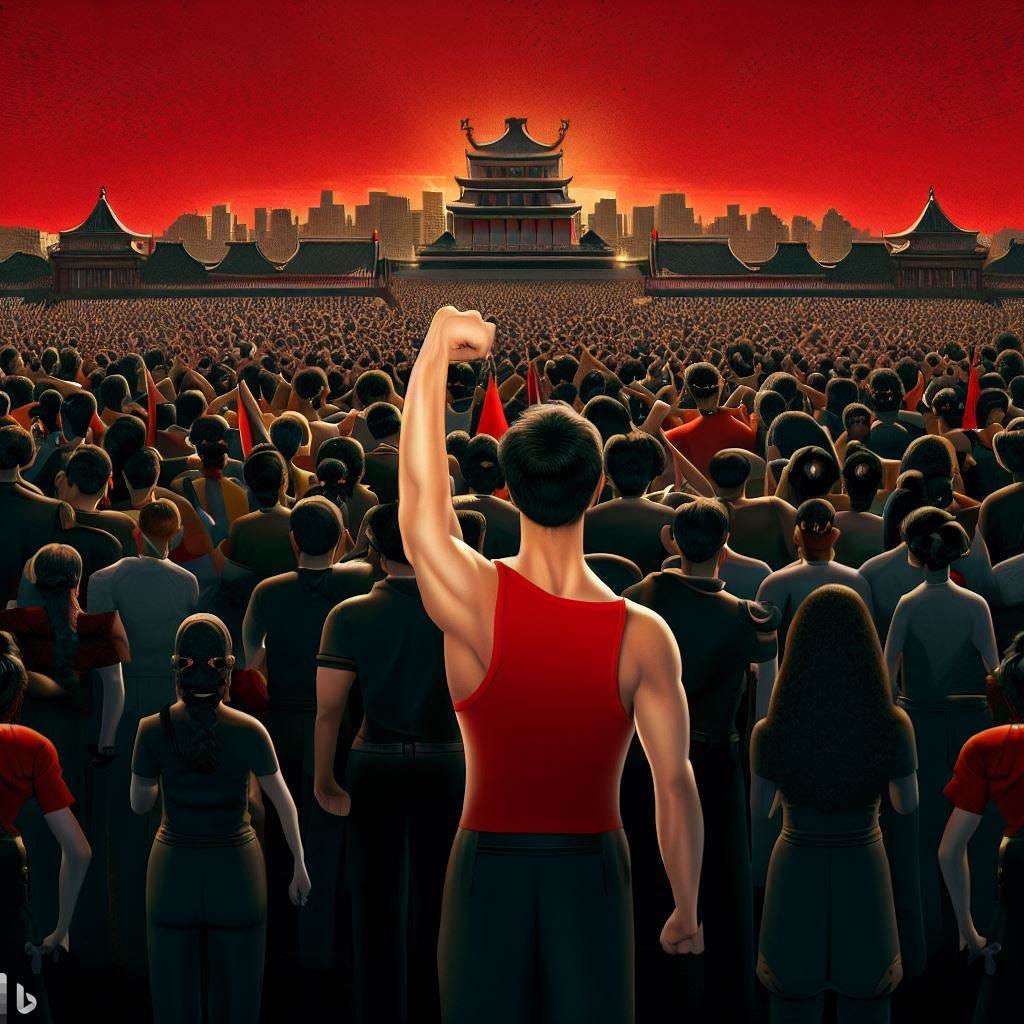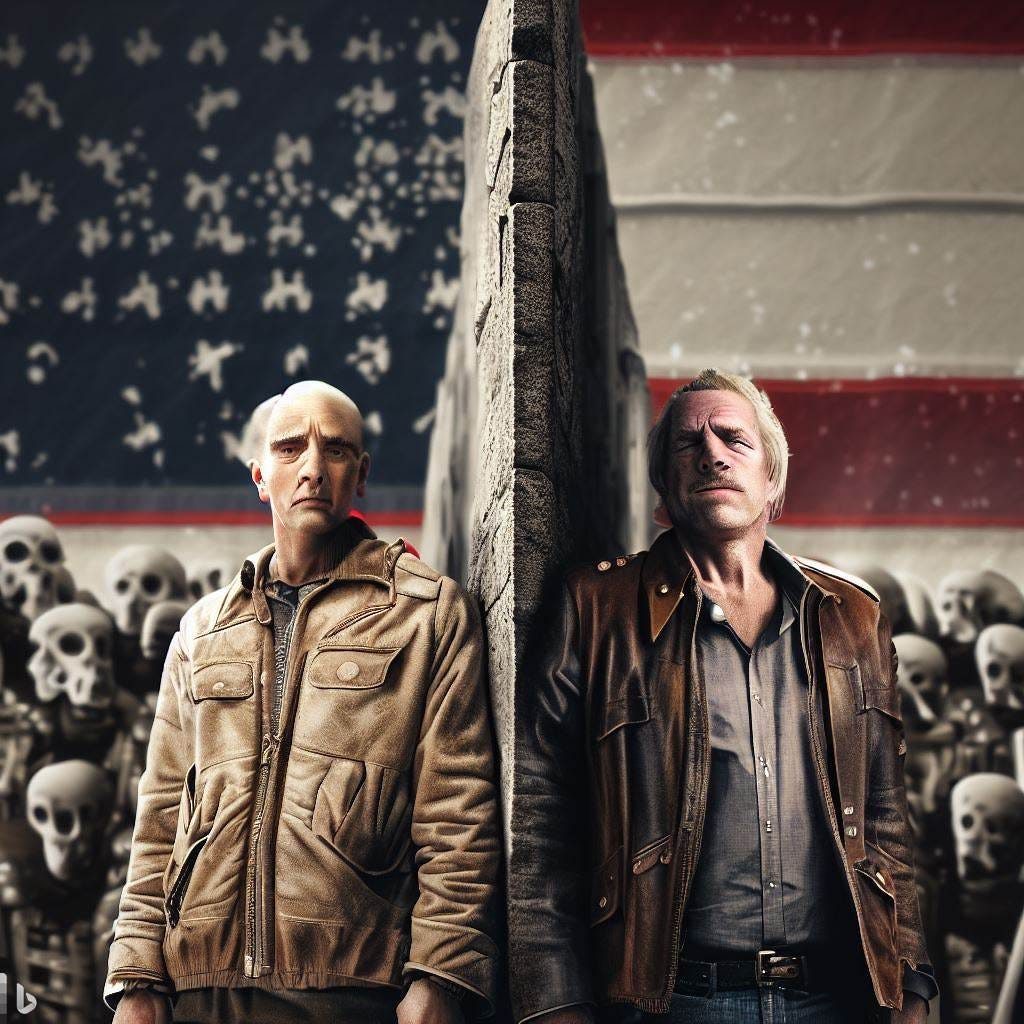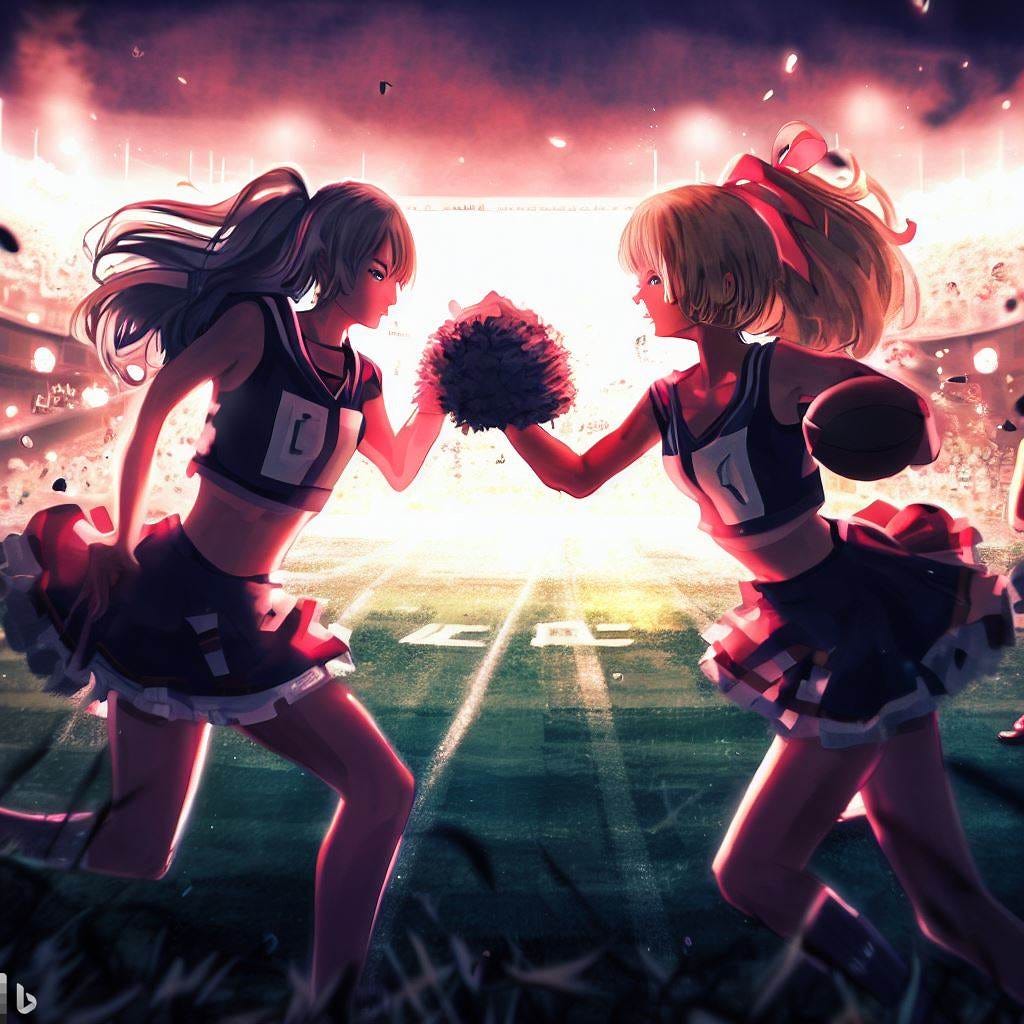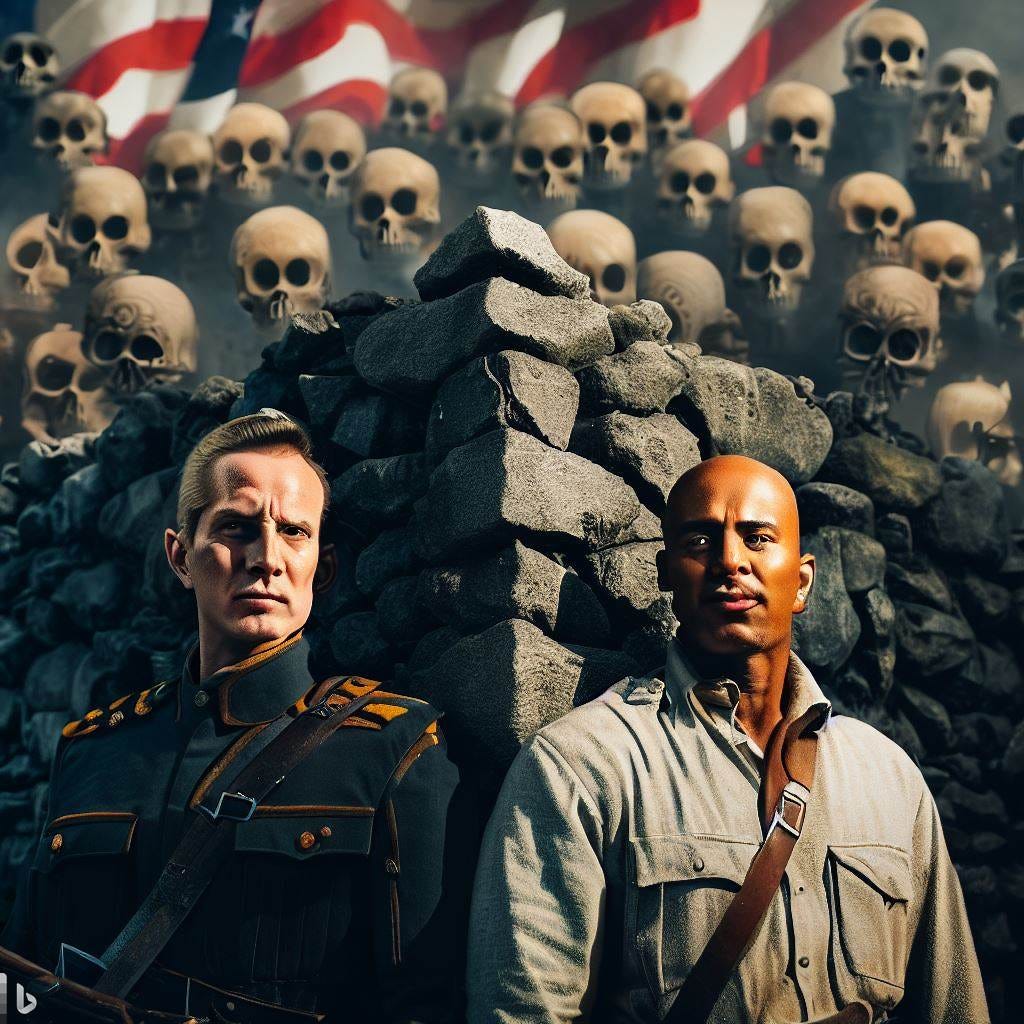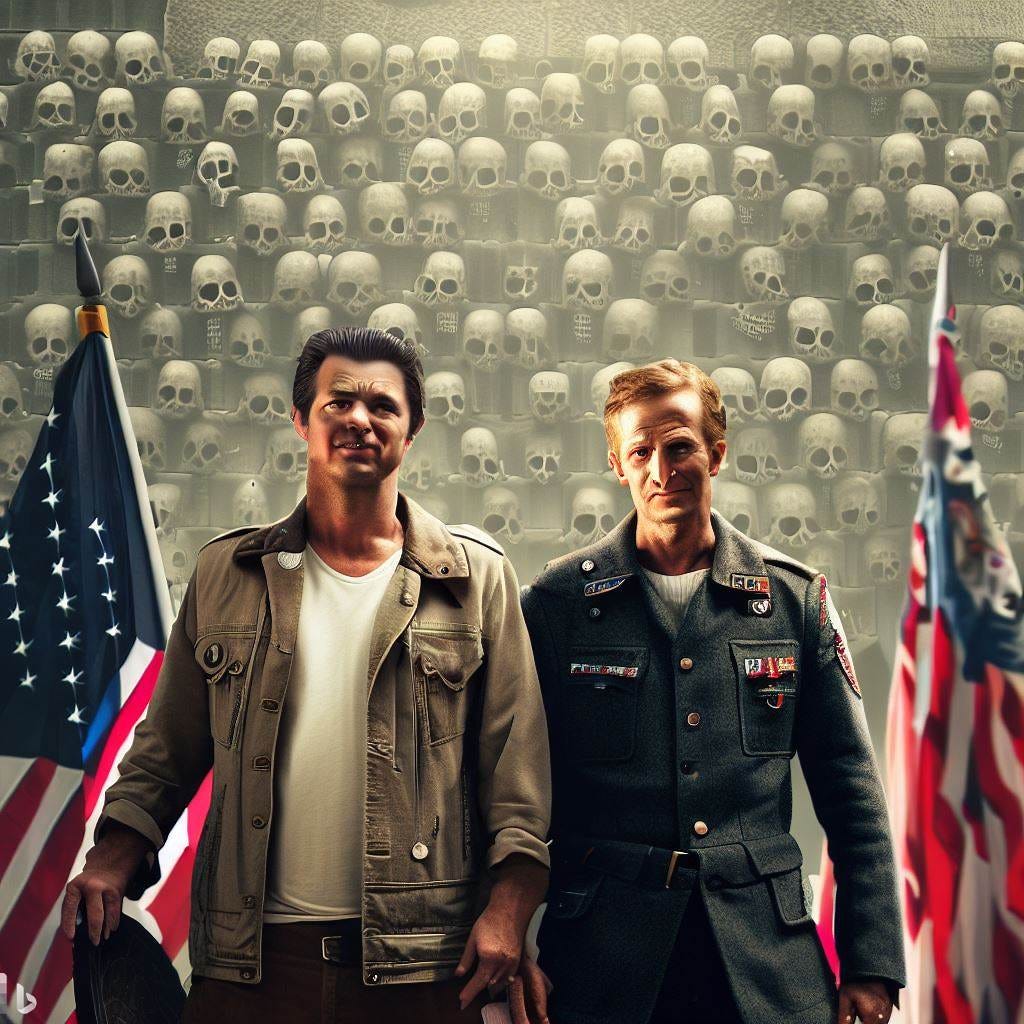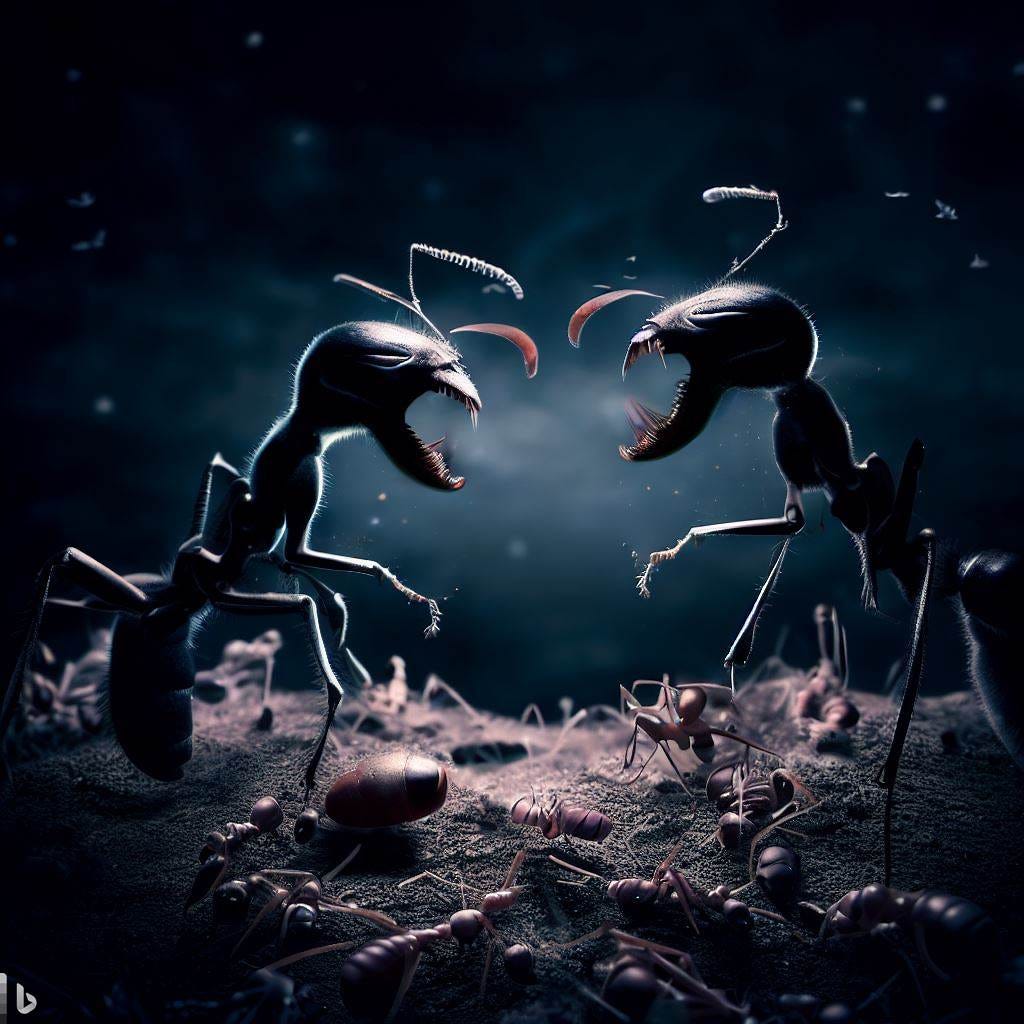Meditation on Patriotism and Different Perspectives
What makes one a patriot? Why do we feel a sense of belonging, loyalty and identity with our country? Is it a logical choice or merely emotional attachment?
“I am a proud American. I am a proud Russian. I am a proud Indian. I am a proud German.” What a strong statement of self-identity. “I am a countryman of this country” carries such enormous baggage, centuries of history, beliefs, religion, politics, ideals, warfare, and culture. To a certain extent, we are all generally attached and identified with these. After all, the environment someone grows up in greatly influences and defines that person for life. If sculptures our whole worldview, our values and becomes a filter through which we judge the world.
“I am an American” is a statement that insinuates I am more than the rest of the human race. I am part of this gigantic power structure that has reigned supreme for the past few decades.
“We, Americans, are always in the right.”
We must protect our way of life, which is the only correct way, far superior to any other. Everybody knows this and agrees with us. And if they don’t, they are primitive communists or some other negative connotation or differentiation. We must share our wisdom and politics by enforcing them on others, who will, of course, only benefit from it all (spreading our democracy, anyone?). Even if we have to kill millions of disagreeable “others” to achieve this goal, replace a few leaders, and cripple a few economies.
“We, Americans, know best.”
The fact that we are one of the youngest nations in the world, and most of us were mere immigrants from other countries not so long ago, doesn’t deter us from the fact that we are the best and we know the best. We are special. It is our duty to police other, less significant countries. The fact that our history is tainted with the blood and tears of lesser nations only proves this point. There can be no question about it. “We are Americans. I am an American. This is who I am!”
Before we proceed, I must clarify that I am not intentionally picking on the American way. It’s just an example I’ve chosen since the USA is the most prevalent in exporting its ideals through culture, money, or violence.
Most importantly, for this particular meditation, they are an extremely patriotic nation. I could have chosen any other country, but I can’t think of a more appropriate case study for this particular issue or one that most of my readers would be so familiar with. Americans are known for identifying with their nation and their immense pride in one’s state of residence. Every country tries its best to nurture patriotism in its citizens. Some are more successful than others, but it is an absolute requisite for reining in the masses, making them pay taxes, support politics, and lay their lives on the line when the time comes to protect the nation’s borders. You know, another imaginary line on the map, agreed upon by men of old, that carries with it such enormous implications but has absolutely zero foundation in nature or objective reality.
What exactly are you so proud of? Have you ever given that any thought?
Is it how prosperous your country is? Is it the bravery of your ancestors? Has some historical figure inspired such loyalty and a feeling of belonging within you? Is it your current leaders and politics you deem so worthy of praise? It is cultural - do you find your nation’s culture far more developed or eloquent than others? Is it ideological? Which is it?
What happens if you disagree with the direction your country’s headed?
Perhaps you find yourself opposing the ideas of your government or some political views you believe are unfair, untrue, or simply causing harm. What if this is not the country you so very loved anymore? What if something has changed within your lifetime?
Do these feelings make you a traitor?
Should you stay loyal no matter what? Is it your duty to do something about it, or should you move to another country that is more aligned with your ethics, ideals, and principles at this moment?
So let’s look deeper at this powerful phenomenon known as patriotism. We could also call it nationalism. Both would apply equally. The other simply has a more negative association for obvious reasons. For this meditation, any form of extreme, powerful, and loyal sense of belonging to any particular group or institution will do. They’re all the same, basically.
In conventional terms, being a patriot is deemed a good thing, a right thing, and a desired value.
Being proud of the country you live in, its history, and its ideals, assuming you share them, would give additional meaning to living in a particular area and putting up with the politics, rules, and troubles of one’s nation. So sure, one can see it as a good thing, especially for the nation’s rulers. It’s an automated, effort-free guarantee of obedience and faithfulness. Then all they have to do is make treason the worst sin in existence and do some marketing magic (propaganda?) on the emotions of their citizens, and they have a relatively simple job of doing whatever they want.
If their citizens get any funny ideas, the solution is simple. Prey on their fear and pick an imaginary enemy to channel their frustration away from their leaders. A scapegoat or a dire outside threat, they both work just fine.
All big companies have been trying to achieve this level of patriotism (identifying, attaching) to their brand for decades. And some have been exceedingly successful at it, too. Most of them are US companies for some weird reason.
So what makes one a patriot?
First, one has to be born somewhere, in this case, on the northern continent of the Americas. Of course, one doesn’t choose where one is born; it’s just a random birthing and genetic lottery. It has nothing to do with one’s ideals upfront, uniqueness, or character. It has nothing to do with one’s choices as a person in the first part of one’s life. It’s just a random placement on the map — a throwing of the dice that has enormous consequences for this person throughout their entire life.
So, no, being born in the USA (or any other specific nation) doesn’t make you an Übermensch. Just lucky, at best. Estimated Worldwide births for 2020 were about 139,877,400. US births for 2020 were 3,605,201. That means 2.5% of all newborns are Americans, giving anyone a 1 in 40 chance in the genetic lottery. There are 7.6 billion people in the world and 328 million people in the US. Source - click. And no, I didn’t check the math. But I guess anything below a 5% chance of being born in the USA seems on the top of the spectrum of possibilities given Earth’s population.
“I am a proud American”; therefore, up to this point simply means that I was born in the USA or that I have somehow immigrated to the USA and managed to get US citizenship, and have adopted the ideals of this country.
Not exactly an achievement or proof of superiority or something to be particularly proud of. To a person born in a less developed country, with perhaps a more rigorous view of personal freedom and a free-market economy, being American sounds like a dream come true. Maybe it is, maybe it isn’t. Many from my country have dreamed of the American way, were indoctrinated with American ideals through cultural exposure, and wished they were born in the “Best country in the world,” as Americans humbly say. So I do understand the appeal. I, too, was mesmerized by all the shiny things the Americans had and we didn’t. Their appeal is fading quickly, though.
What would happen if this same person, the American, was instead born in Russia? China? Germany? Serbia? (anywhere else)
He would be a proud Russian, Chinese, German, and Serbian.
Instead of whiskey, he would prefer to get drunk on vodka, baijiu, bear, or rakija. He would look up to different local heroes, ideologies, or cult personalities and sing other anthems, but these are just various flavors of the same thing.
Our hero is now a true patriot because he lives, was born, or has immigrated to this specific country! From his perspective, this is the best country in the world.
He feels far superior to the Germans, Russian, Chinese, and Serbians (random examples). Actually, he has been told throughout his life that the people of those countries were, at one point or another, his enemies. If he happened to live at a certain point in time, he might find himself entangled in a conflict where he would either end one of the other nationals’ lives or vice versa.
So these innocent babies, randomly distributed throughout the world, each falling within certain artificial lines (borders), who could have been best friends, lovers, and brothers, are now enemies willing to kill one another. And they all feel, nay believe with all their hearts, that they are in the right to do so. That God and history will be on their side, conveniently forgetting the “love thy neighbor “part, I guess. They believe that theirs is the right side - that they’re the good guys. The “other” person or nation is the enemy, the evil personified who must perish for them and theirs to thrive. Isn’t that interesting?
Here we see the power of perspectives. Our worldview, identity, and idea of right and wrong, good and evil, sometimes stem from a random place of birth. Pride and patriotism arise from a plethora of factors, and the strength of those feelings is very dependent on one’s tighter social environment, the biggest being one’s family. But they are all predetermined by the place of our birth. When born in some country, we inevitably adopt their values, ideologies, myths, culture, history, language, heroes, stories, and most importantly, perspectives. Our immediate social environment determines our character, fundamental beliefs, and values.
Our whole worldview will never again be pure, objective, and authentic. It's impossible.
From a blank canvas of an innocent child, full of infinite possibilities, we are molded throughout our lives into whoever we end up being. Each person, situation, and conversation contributes to the mosaic of who we are and what we believe about the world. And those beliefs then become the filter through which we see everything around us.
Most importantly, none of those beliefs and perspectives are objectively “right” or “true.” Whatever we think we know for a fact is mostly just an opinion derived from our particular point of view.
It is crucial to understand this point! We can look at any conflict in the history of human existence and see that there is never just one right side, one truth, but different perspectives, depending on which side we find ourselves on. Since “history is written by the victor,” there almost always seems to be a clear good and bad guy. But for the most part, that is an illusion.
Let’s now look at two groups of people in competing environments and explore different perspectives. It could be sports, trade, land, or war.
I was always amused by how strongly some people feel about sports, especially how fiercely they root for their team and boo against the other team.
Fans would dress in the appropriate colors, yell their slogans of support or slur, and unite by emotionally sharing in the victories or defeats of their teams. This behavior isn’t limited to international competitions either. People grow attached to the teams from their towns, high schools, colleges, or simply teams they have grown fond of that they have zero connection to otherwise. Have you noticed that the energy, the vibe of such competitions is eerily similar to war?
That makes sense since it was the initial purpose of the Olympic games in the beginning. Countries would measure their strength by competing at games in the arena instead of fighting in the fields of death. A pressure valve, if you will.
So let’s say you went to high school A, and your school is now playing high school B in a football game.
Both have good players, some not so good, some excellent. Both have the same objective - to win the game. Both have fan bases originating from their high schools or their local towns. Both are relatively equal, randomly distributing the winning or losing streaks throughout the games, seasons, and years. Both want their team to bask in the sweet victory and the other to suffer the humiliating pain of defeat.
The only real difference between them is where they were born or where they go to school. Again random distribution, a lottery, evolves into us versus them, friends versus enemies. There is no good or evil here. Only kids playing a game of football, each trying their best to win.
Nothing substantial is on the line, yet these games can get very heated. Anger, tears, foul language, and even violence are the norm, not the exception. Fans and players feel patriotic to their school, town, and team and look unfavorably on the other team. And that doesn’t change even if the other players are better. There will be no appreciation, no praise for the opposing team. There might even be occasional calls for treason if one should be so inclined or even mention out loud that they deserved the victory. At this moment, they are the enemy. Just like in the fields of war, luckily with milder consequences.
School A’s perspective: team A are the good guys and team B are the bad guys.
School B’s perspective: team B are the good guys and team A are the bad guys.
And that has nothing to do with "truth." There is no good and evil here.
Only different perspectives.
In this case, there is also a clear third party—the unattached neutral observer.
Perhaps a random audience from another country or some talent scout looking for a new prospective player for the big leagues. Maybe even an impartial judge. This third perspective is the only one that can be objective and neutral.
In sports, these things are clear as day, and hardly anyone would object to these facts, as long as he’s not team A or B personally. And it’s no different in just about any other subject matter, unfortunately. It is only our blind belief, loyalty, and patriotism that blind us from these facts sometimes.
Die-hard fans will also identify and feel pride, success, or failure along with their beloved team. “We won, beat them, were better, we are the best!” They often exclaim. Who’s this “we” you speak of? What exactly did you have to do with winning this competition? And drunkenly yelling from your sofa doesn’t count! The “we” part is simply you identifying with some athlete or team that somehow appeals to you for whatever reason (town, nationality, ideals, likeness…).
What happens if we move towns, countries, and schools?
Who do we identify with now? What happens to a player who changes their team and goes to play for another team in another country even? Does that change their perspective? Does it change who the proverbial enemy and the good guys are? Is he a traitor now? Emotions are weird, aren’t they?
We could again draw similarities with the war between nations. Politicians instigate conflicts, generals direct the soldiers, soldiers do the killing and the dying, and the whole thing is always applied to the rest of the nation, who had nothing to do with it on both sides. They take the credit for what they believe their “country” did right and take the blame for everything other nations think their “country” did wrong. “The Americans are murdering children in the middle east. The Russians are murderous terrorists who want to conquer Europe. The Chinese are dirty communists who hate freedom. The Germans hate Jews, and Serbians dream of destroying their neighbors.” (insert any prejudice you can think of here)
Do you see how ridiculous these sorts of generalizations are? If you don't, you really should travel more!
Get out there. Meet new people. Open yourself up to new cultures and nationalities. You’ll find no terrorists and enemies on your travels - only kind, helpful people trying to love their families and live their lives as best they can, with their dreams and fears, just like you and me. We all just want to love, be loved, and live happy lives. We might imagine how we get there differently and what that means, but we are one people at our core!
Our company.
Similarly, when we are part of a bussiness, we are on a team “this company,” which means that our sole purpose for existence within this company is to work for the ideals and goals of the company’s leaders or owners.
We have to crush the competition. They are the enemy and take over as much of the market as we possibly can. Ideally, we would become the most prominent company with the largest market share, annihilating the competition. The sole purpose of any company is to make profits for the owners of the company. And that goes for every single “for-profit” company in existence. It’s in the name, people. Even the ones that sound like their purpose is to do good in the world, like pharmaceutical companies, medical facilities, educational establishments, etc.
What happens if your beloved company doesn’t make profits? How long does it continue to operate? What happens to the employees? No profit, no company. It’s as simple as that. Government and non-profit organizations have somewhat different mandates, although if you dig hard enough, you’ll find similar incentives at the institution’s core. As long as humans are involved, individual perspectives and interests will be at play, and games of us vs. them will inherently rule any relationship, whether we like to admit it or not.
So we are now faithful little corporate soldiers, hard-working employees, and in ideal conditions (but in practice rarely) minor co-owners. And our job is to sell more than any other competitor. We must make the sales. We must take the money from the clients. We must be the best. We must make the most profits. If we fail and our competitors succeed, we will have to shut down, cease to exist as a company or be fired individually. Our families will starve, we will have to start all over again, and so on. Our perspective and our incentives are clear.
And as we are now on “team company,” we only care about our perspective. We have to survive. We have to profit and to hell with other companies and competition.
What is good for us is bad for them, and what benefits them hurts us. We are the good guys. They are the enemy. Most of us never consider what our victory in the market, especially an overwhelming one, will mean for the other side.
The competing company also has employees. Those employees also have families. Hungry mouths to feed. Innocent children who will fall into poverty if we are victorious. Lives will be ruined, some perhaps even ended. But they’re not our problem. If they fail, it’s their fault. It’s us versus them. We all have to care for our people and interests. And it’s hard to disagree with this statement, especially if one wants to avoid socialistic, holistic, or hippie ideologies. But there’s a lesson here if you can find it.
What happens if we then switch our employer and end up on the competing team?
Who’s the good guy now? How do we feel about our previous company and their employees? Does our perspective change? If we know personally some people in the other company, who will now end up on the street, unemployed and broke? Is the enemy still just an enemy to be crushed to oblivion?
And how do we perceive these same people from another company if they come to work for us? No more enemies, but friends? Funny how that works.
How exactly is this any different than at a national level?
When people transition to another country, they are often labeled traitors. Do their perspectives change when they move? Did they change? Are they no longer the same person?
What if they have spent their lives bettering or fighting for their country but now no longer see eye to eye with the current leadership?
Should they just shut up and take it? Should they resist from the inside? Must they, being true patriots, stay loyal to a corrupt government that perhaps even murders innocent people? Should they avert their eyes in blind love for their country? Should they protect their secrets even when they feel complacent in so doing?
If you have a particular traitor/hero (depending on your perspective) in mind, notice how you feel about this subject. Think of someone who betrayed and exposed your country’s secrets. Now try to find an opposite example. Someone who stood by when their government was doing unspeakable things to the innocent and did nothing.
Who’s the traitor, and who’s the hero?
Why is one a traitor and the other a hero? How do you know that for certain people, it was right to stand against their government and take the heat for being branded traitors and not for others? So many questions, but still just one point.
There are very few objective truths, only different perspectives, my friends. If we could see things objectively, from different perspectives, we would argue a lot less than we do now.
It was said that the “truth shall set you free.” What if that “truth” is just the understanding that all things are perspectives and that there is no “one truth” that would apply to all? What if “understanding” is the truth we require to become free from the limits of our beliefs, mental models, and emotions? I don’t know, but I think it’s worth exploring the subject. The whole “us vs. them” approach hasn’t been working out all that well.
Imagine two alien nations, fighting on some distant planet.
You have no attachments and nothing in common with either of them. You have no horse in the race, either. The outcome of their conflict will be of no consequence to you whatsoever. You don’t even like one race of aliens over the other. You are now a true third-party neutral observer - as much as you can be.
You observe how they fight, argue, and slaughter each other. Each alien nation is entirely convinced they are in the right and are the good guys. From where you are sitting, they all look like the bad guys, as all they do is kill each other and try to oppress and starve one another. One side goes on about their history and how they got on this planet first, and the other tells their side of the story that contradicts more or less everything presented by the opposing side. None of them are willing to compromise; none will move an inch on their claims.
How would you judge which alien nation is in the right and which in the wrong?
How would you determine with certainty who are the good guys and who the bad guys? How would you choose a side if you had to help one side defeat the other? Remember, you have no horse in the race, interest, relationship, or attachment! You would try to judge the facts of the case, I assume. Find the guilty party, the oppressor, the tyrant, the invader. What if you can’t? What if those are just the roles they kept exchanging throughout their history?
If aliens are a bit too difficult a concept for you to imagine, use ants in that same example.
Two factions of ants from nearby anthills are fighting for territory. Both of their colonies’ existence seems to depend on the outcome. Which side is right and which is wrong? Why?
Bonus question - do you even care about their petty squabbles? Be honest!
Without emotional attachments and self-identity with either warring faction, making such determination can prove challenging, can’t it? There are no clear good and bad guys here. Or anywhere else, for that matter. Only different perspectives, beliefs, interests, and stories.
How is that any different from most wars humanity has fought time and time again?
Wouldn’t you want these two opposing factions to make peace, compromise, and find a path forward together, preferably the kind that doesn’t involve escalation of further conflict and loss of lives? It’s only logical, but we’re humans, and logic doesn’t guide our choices and actions; emotions do, as instinct guides ants into genocide.
And so we fight and argue and fail to understand each other’s perspectives, doomed to repeat these vicious cycles over and over again. If only there were a way to breach this wall and find a way to understand each other better. If only.
Sharing is caring, especially in the online digital world.
You have my FULL PERMISSION to share, post, tweet, cross-post, and restack this content. In fact, I encourage it. If you would like to support my work by subscribing, sharing this post, or donating, follow this LINK and learn how. You are appreciated.







